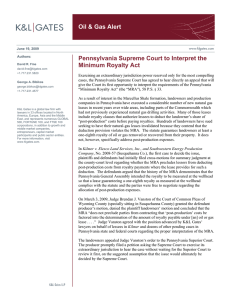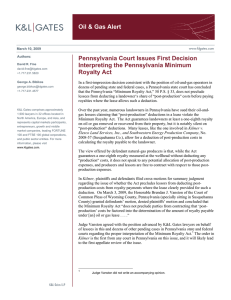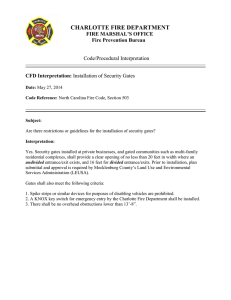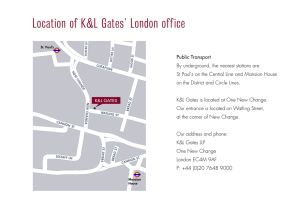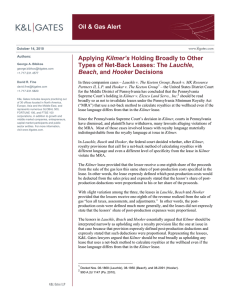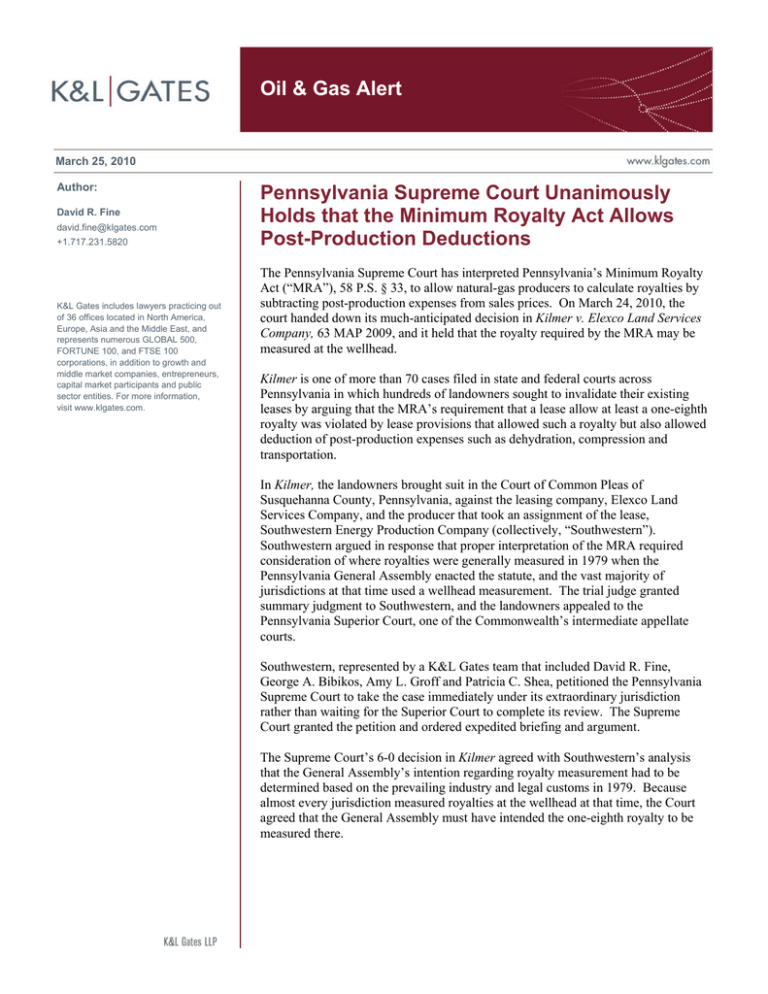
Oil & Gas Alert
March 25, 2010
Author:
David R. Fine
david.fine@klgates.com
+1.717.231.5820
K&L Gates includes lawyers practicing out
of 36 offices located in North America,
Europe, Asia and the Middle East, and
represents numerous GLOBAL 500,
FORTUNE 100, and FTSE 100
corporations, in addition to growth and
middle market companies, entrepreneurs,
capital market participants and public
sector entities. For more information,
visit www.klgates.com.
Pennsylvania Supreme Court Unanimously
Holds that the Minimum Royalty Act Allows
Post-Production Deductions
The Pennsylvania Supreme Court has interpreted Pennsylvania’s Minimum Royalty
Act (“MRA”), 58 P.S. § 33, to allow natural-gas producers to calculate royalties by
subtracting post-production expenses from sales prices. On March 24, 2010, the
court handed down its much-anticipated decision in Kilmer v. Elexco Land Services
Company, 63 MAP 2009, and it held that the royalty required by the MRA may be
measured at the wellhead.
Kilmer is one of more than 70 cases filed in state and federal courts across
Pennsylvania in which hundreds of landowners sought to invalidate their existing
leases by arguing that the MRA’s requirement that a lease allow at least a one-eighth
royalty was violated by lease provisions that allowed such a royalty but also allowed
deduction of post-production expenses such as dehydration, compression and
transportation.
In Kilmer, the landowners brought suit in the Court of Common Pleas of
Susquehanna County, Pennsylvania, against the leasing company, Elexco Land
Services Company, and the producer that took an assignment of the lease,
Southwestern Energy Production Company (collectively, “Southwestern”).
Southwestern argued in response that proper interpretation of the MRA required
consideration of where royalties were generally measured in 1979 when the
Pennsylvania General Assembly enacted the statute, and the vast majority of
jurisdictions at that time used a wellhead measurement. The trial judge granted
summary judgment to Southwestern, and the landowners appealed to the
Pennsylvania Superior Court, one of the Commonwealth’s intermediate appellate
courts.
Southwestern, represented by a K&L Gates team that included David R. Fine,
George A. Bibikos, Amy L. Groff and Patricia C. Shea, petitioned the Pennsylvania
Supreme Court to take the case immediately under its extraordinary jurisdiction
rather than waiting for the Superior Court to complete its review. The Supreme
Court granted the petition and ordered expedited briefing and argument.
The Supreme Court’s 6-0 decision in Kilmer agreed with Southwestern’s analysis
that the General Assembly’s intention regarding royalty measurement had to be
determined based on the prevailing industry and legal customs in 1979. Because
almost every jurisdiction measured royalties at the wellhead at that time, the Court
agreed that the General Assembly must have intended the one-eighth royalty to be
measured there.
Oil & Gas Alert
Because of the difficulty in assessing the value of
raw gas at the wellhead, producers developed a netback method to calculate royalties that subtracted
from the downstream sales price the expense
associated with moving the gas from the wellhead to
the market. In Kilmer, the Supreme Court held that
a lease that incorporates such a net-back calculation
meets the requirements of the MRA.
This result is particularly important to the ongoing
development of the Marcellus Shale because the
landowners in Kilmer and dozens of other, similar
cases sought to invalidate their leases, and a
decision in their favor would have affected not only
their leases but potentially thousands more with
similar royalty provisions. The Supreme Court’s
decision is also critical because a number of
producers were understandably reluctant to drill
wells on land under challenged leases.
Anchorage Austin Beijing Berlin Boston Charlotte Chicago Dallas Dubai Fort Worth Frankfurt Harrisburg Hong Kong London
Los Angeles Miami Moscow Newark New York Orange County Palo Alto Paris Pittsburgh Portland Raleigh Research Triangle Park
San Diego San Francisco Seattle Shanghai Singapore Spokane/Coeur d’Alene Taipei Tokyo Warsaw
Washington, D.C.
K&L Gates includes lawyers practicing out of 36 offices located in North America, Europe, Asia and the Middle East, and represents numerous
GLOBAL 500, FORTUNE 100, and FTSE 100 corporations, in addition to growth and middle market companies, entrepreneurs, capital market
participants and public sector entities. For more information, visit www.klgates.com.
K&L Gates is comprised of multiple affiliated entities: a limited liability partnership with the full name K&L Gates LLP qualified in Delaware and
maintaining offices throughout the United States, in Berlin and Frankfurt, Germany, in Beijing (K&L Gates LLP Beijing Representative Office), in
Dubai, U.A.E., in Shanghai (K&L Gates LLP Shanghai Representative Office), in Tokyo, and in Singapore; a limited liability partnership (also named
K&L Gates LLP) incorporated in England and maintaining offices in London and Paris; a Taiwan general partnership (K&L Gates) maintaining an
office in Taipei; a Hong Kong general partnership (K&L Gates, Solicitors) maintaining an office in Hong Kong; a Polish limited partnership (K&L
Gates Jamka sp. k.) maintaining an office in Warsaw; and a Delaware limited liability company (K&L Gates Holdings, LLC) maintaining an office in
Moscow. K&L Gates maintains appropriate registrations in the jurisdictions in which its offices are located. A list of the partners or members in each
entity is available for inspection at any K&L Gates office.
This publication is for informational purposes and does not contain or convey legal advice. The information herein should not be used or relied upon
in regard to any particular facts or circumstances without first consulting a lawyer.
©2010 K&L Gates LLP. All Rights Reserved.
March 25, 2010
2


